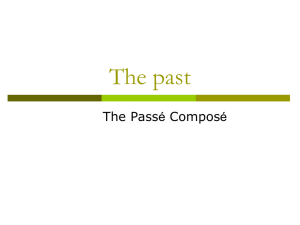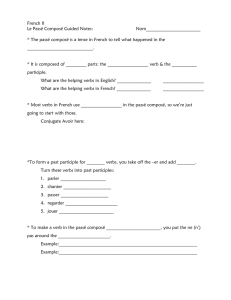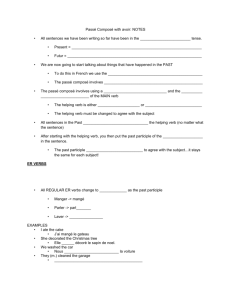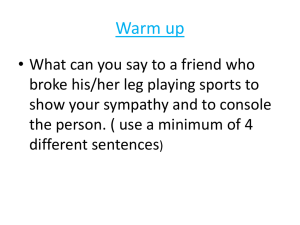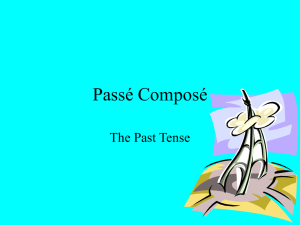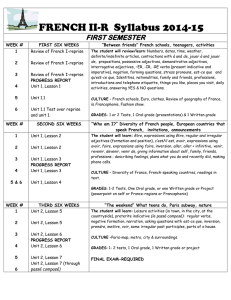Lesson 04.01 Le Passé Composé
advertisement
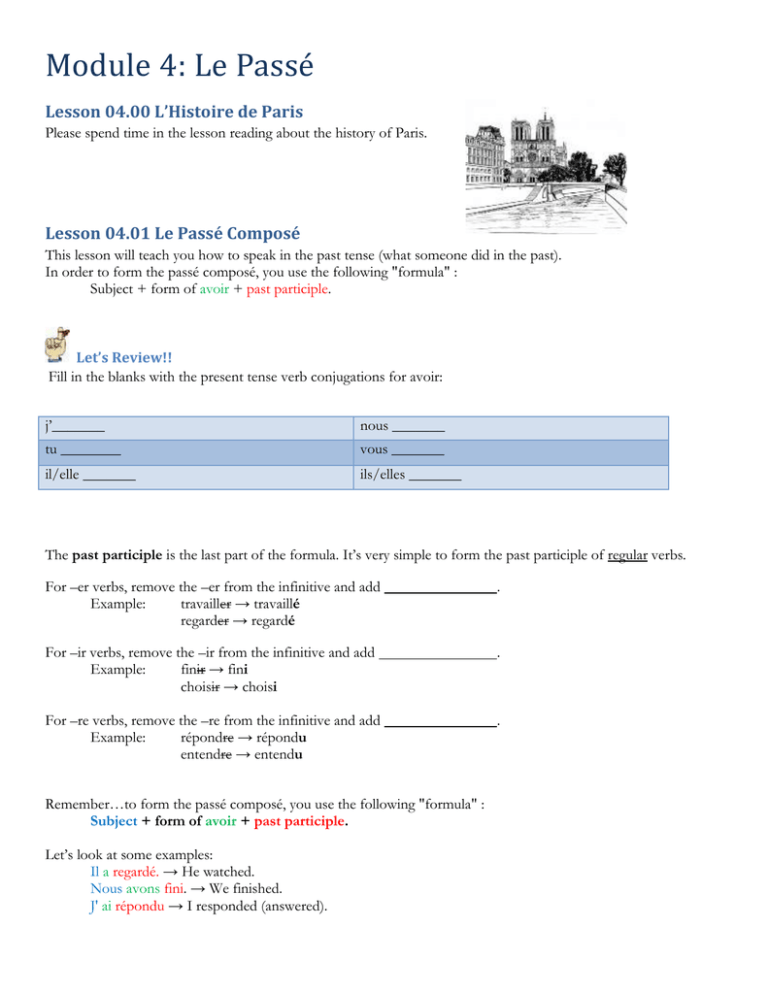
Module 4: Le Passe Lesson 04.00 L’Histoire de Paris Please spend time in the lesson reading about the history of Paris. Lesson 04.01 Le Passé Composé This lesson will teach you how to speak in the past tense (what someone did in the past). In order to form the passé composé, you use the following "formula" : Subject + form of avoir + past participle. Let’s Review!! Fill in the blanks with the present tense verb conjugations for avoir: j’_______ nous _______ tu ________ vous _______ il/elle _______ ils/elles _______ The past participle is the last part of the formula. It’s very simple to form the past participle of regular verbs. For –er verbs, remove the –er from the infinitive and add Example: travailler → travaillé regarder → regardé . For –ir verbs, remove the –ir from the infinitive and add Example: finir → fini choisir → choisi . For –re verbs, remove the –re from the infinitive and add Example: répondre → répondu entendre → entendu . Remember…to form the passé composé, you use the following "formula" : Subject + form of avoir + past participle. Let’s look at some examples: Il a regardé. → He watched. Nous avons fini. → We finished. J' ai répondu → I responded (answered). Lesson 04.02 Les Adverbes Adverbs are words that tell how or how you do an activity. Fill in the missing words : French English well mal often trop beaucoup sometimes always here là soon quickly yesterday tomorrow jamais early late maintenant already rather peu maybe d’abord puis then, so thus finally Plus d’Adverbes In addition to adverbs you simply must learn, there are many other adverbs you can form in French by adding -ment to the end of the adjective. Examples: poli—poliment (politely) vrai—vraiment (truly) récent—récemment (recently) Some rules to follow when adding –ment: Add -ment to the feminine singular form of the adjective. heureux (heureuse)—heureusement Add - ment to the masculine singular form of adjectives that end in a vowel. poli—poliment Add -emment to the adjective that ends in -ent. Add -amment to the adjective that ends in -ant. fréquent—fréquemment méchant—méchamment Helpful Hints: Adverbs are generally placed Paul chante mal. conjugated verbs. Adverbs are generally placed right after the verb, even before objects. J'aime beaucoup le français! This is even true with the passé composé - the adverb will generally come right after the form of avoir, before the past participle. Nous avons trop mangé. Adverbs of time or place may be placed at the beginning of or at the end of the entire sentence. Sometimes you will insert "de" after the adverb if the next word is a noun. Nous avons peu de pain. Ils ont assez de copains. Les Vendanges Read the passage about Les Vendanges carefully. 04.03 Le Passé Composé Irregulars You’ve already learned about passé composé with regular verbs. Now you’ll learn about passé composé with IRREGULAR verbs. These verbs will have irregular past participles. You will need to memorize these. Fill in the chart below with the missing word: Infinitive Past Participle faire ecrire vu pris dire être lu boire avoir mis Helpful Hint: When making a past tense sentence negative, the ne…pas goes around the form of avoir. Remember that ne becomes n' when the auxiliary verb starts with a vowel. Examples: Affirmative J'ai joué au volley. Nous avons joué au volley. Negative Je n'ai pas joué au volley. Nous n'avons pas joué au volley. Lesson 04.04 La Pronunciation Please spend time in the lesson practicing the adverbs that end in –ment. 04.05 Le Passé with Être Most verbs use avoir to form the passé composé. But there is a group of 16 verbs which use place of avoir. in You will need to memorize this list of verbs, but the acronym DR MRS VANDERTRAMP will help you remember these verbs. Fill in the blanks below with the 16 verbs that use être in place of avoir. Then write the past participle and English translation: Infinitive Past Participle English Translation allé to go D R M R S V Aller N D E R T R A M P The passé composé with être is similar to the passé composé with avoir. However, when the passé composé is formed with être, the past participle behaves like an . If you have a feminine subject, you must also have a feminine past participle (you add an E to the past participle). Il est allé. (masculine) Elle est allée. (feminine) If the subject is plural, the past participle must also be plural (you add an S to the past participle). Ils sont allés. (masculine plural) Elles sont allées. (feminine plural) Helpful Hint: All of these forms of allé sound the same in spoken French, but it is important to remember these rules of agreement when writing French. Il est allé. Elle est allée. Ils sont allés. Elles sont allées. Module Review for DBA: Here are the topics to review for your exam and DBA. 04.00 Paris 04.01 the passé composé 04.02 les adverbes lesson vocabulary the grape harvest 04.03 irregular past participles 04.04 the pronunciation of words ending in –ment listening comprehension 04.05 le passé composé with être listening comprehension
